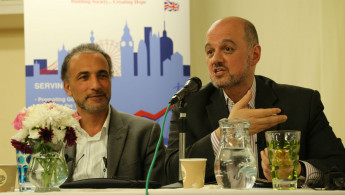UK Muslims must engage with their society
Swiss academic, Tariq Ramadan and President of the Cordoba Foundation, Anas Altikriti, were the charismatic speakers at an event hosted by the Muslim Association of Britain Wednesday evening in London.
The event had sold out three days after tickets went on sale and the room was full of Muslims from a range of backgrounds. They were there to hear what the speakers had to say about the current climate for Muslims in the UK.
| Whether you like it or not, we are part of the system. - Anas Altakriti |
Ramadan opened by explaining that the issues facing Muslims today "is not a religious one. They'll ask you about your culture and if you share 'British values' without really knowing what they mean."
He raised concerns over the emergence of an informal status that he referred to as "foreign citizenry", saying that Muslims may be citizens in their legal status, "but in discussion [we] don't belong in the country. [We] are perceived as the 'other'."
In terms of solutions and moving forward, Ramadan was keen to encourage Muslims to work on their understanding of Islam and their religious reference, which he repeatedly noted as a cause for concern in the Muslim community. The academic emphasised the importance for Muslims to engage with and understand their religion on their own terms, not just in response to the questions posed to them from those who may be attacking Islam from the outside.
He also warned the audience that many of those who oppose Islam today are more familiar with the texts than some Muslims and that this will serve to further weaken the position of Muslims in Europe, if they are unable to highlight their priorities and end up following the discourse set out by oppositions to Islam.
Beyond the call to study the terminology and interpretation of Islam, Ramadan quoted Algerian philosopher Malek Bennabi who said "we were colonised because we were colonisable", and stressed that in today’s context Muslims are being divided because they are "dividable". Highlighting the discourse coming between Shia and Sunni and even among Sunni Muslims, Ramadan stressed the need he saw for intra-community dialogue and unity.
The biggest threat
Ramadan then reiterated a point he has made several times in the past regarding the need for Muslims to mix not simply within Muslim communities, but also within the wider communities, in media and in politics, in order to have a greater visible presence and contribution to society.
One gentleman in the audience raised concerns that the advice given by Ramadan to engage in issues outside of the Muslim community put Muslims in a difficult position. Integration could lead to assimilation, and Muslims finding themselves in situations where they feel like they have to modify their behaviour in such a way that would go against their principles. He mentioned the example of having to shake hands with members of the opposite sex, or women being unable to wear niqab (face veil).
The question itself demonstrated some of the concerns that Ramadan had raised, and he tackled it by stressing that individuals must find a way of reconciling their own beliefs with their ability to function within a society, and remarked that one shouldn't "leave the priorities for the details", priorities that according to Ramadan mean engaging with the issues of society at large, and not contributing to the isolation of Muslims in Europe.
Anas Altikriti supported a number of the issues raised by Ramadan, and spoke with a level of urgency about the need for Muslims to actively engage with issues outside the realms of religion and Islam, including education, the economy and politics.
He was vocal about his belief that Muslims should accept their role as citizens and not think that abstention from voting means that one is not "playing politics".
"Whether you like it or not, we are part of the system. We pay our taxes deemed by that system. We send our children to school as at the age the system tells us to, we deal with banks according to the system – and by the way you’re doing a great disservice, not only to Muslims, but the welfare of the society which you as well as your children and grandchildren will have to live in."
His most fervent message was made in reference to the potential outcome of the next general election: "We have a real threat coming up, and that is the threat of handing over the reigns of power and giving authority to people who have no problem with speaking in racist terms, behaving in racist terms and that by the way is not going to be to the detriment of Muslims alone, it’s going to be to the detriment of society as a whole."
According to both Ramadan and Altikriti, time is of the essence. The future wellbeing of Muslims in Britain demands that Muslims work on an individual level, within their communities and beyond the borders of religion, to prevent themselves from being isolated from the society in which they live.



